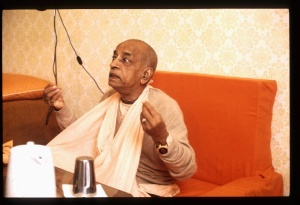SB 4.16.23: Difference between revisions
m (1 revision(s)) |
No edit summary |
||
| Line 1: | Line 1: | ||
{{info | {{info | ||
|speaker=professional reciters | |speaker=professional reciters | ||
|listener=King | |listener=King Pṛthu | ||
}} | }} | ||
[[Category:Srimad-Bhagavatam - Canto 04 Chapter 16]] | |||
[[Category:Bhagavatam Verses Spoken by the Professional Reciters - Vanisource|041623]] | |||
<div style="float:left">'''[[Srimad-Bhagavatam]] - [[SB 4|Fourth Canto]] - [[SB 4.16: Praise of King Prthu by the Professional Reciters|Chapter 16: Praise of King Pṛthu by the Professional Reciters]]'''</div> | |||
<div style="float:right">[[File:Go-previous.png|link=SB 4.16.22]] '''[[SB 4.16.22]] - [[SB 4.16.24]]''' [[File:Go-next.png|link=SB 4.16.24]]</div> | |||
{{RandomImage}} | |||
==== TEXT 23 ==== | ==== TEXT 23 ==== | ||
<div | <div class="verse"> | ||
visphūrjayann āja-gavaṁ dhanuḥ svayaṁ | :visphūrjayann āja-gavaṁ dhanuḥ svayaṁ | ||
yadācarat kṣmām aviṣahyam ājau | :yadācarat kṣmām aviṣahyam ājau | ||
tadā nililyur diśi diśy asanto | :tadā nililyur diśi diśy asanto | ||
lāṅgūlam udyamya yathā mṛgendraḥ | :lāṅgūlam udyamya yathā mṛgendraḥ | ||
</div> | </div> | ||
| Line 16: | Line 22: | ||
==== SYNONYMS ==== | ==== SYNONYMS ==== | ||
<div | <div class="synonyms"> | ||
''visphūrjayan''—vibrating; ''āja-gavam''—made of the horns of goats and bulls; ''dhanuḥ''—his bow; ''svayam''—personally; ''yadā''—when; ''acarat''—will travel; ''kṣmām''—on the earth; ''aviṣahyam''—irresistible; ''ājau''—in battle; ''tadā''—at that time; ''nililyuḥ''—will hide themselves; ''diśi diśi''—in all directions; ''asantaḥ''—demoniac men; ''lāṅgūlam''—tail; ''udyamya''—keeping high; ''yathā''—as; ''mṛgendraḥ''—the lion. | |||
</div> | </div> | ||
| Line 23: | Line 29: | ||
==== TRANSLATION ==== | ==== TRANSLATION ==== | ||
<div | <div class="translation"> | ||
When the lion travels in the forest with its tail turned upward, all menial animals hide themselves. Similarly, when King Pṛthu will travel over his kingdom and vibrate the string of his bow, which is made of the horns of goats and bulls and is irresistible in battle, all demoniac rogues and thieves will hide themselves in all directions. | When the lion travels in the forest with its tail turned upward, all menial animals hide themselves. Similarly, when King Pṛthu will travel over his kingdom and vibrate the string of his bow, which is made of the horns of goats and bulls and is irresistible in battle, all demoniac rogues and thieves will hide themselves in all directions. | ||
</div> | </div> | ||
| Line 30: | Line 36: | ||
==== PURPORT ==== | ==== PURPORT ==== | ||
<div | <div class="purport"> | ||
It is very appropriate to compare a powerful king like Pṛthu to a lion. In India, kṣatriya kings are still called siṅgh, which means "lion." Unless rogues, thieves and other demoniac people in a state are afraid of the executive head, who rules the kingdom with a strong hand, there cannot be peace or prosperity in the state. Thus it is most regrettable when a woman becomes the executive head instead of a lionlike king. In such a situation the people are considered very unfortunate. | It is very appropriate to compare a powerful king like Pṛthu to a lion. In India, kṣatriya kings are still called ''siṅgh'', which means "lion." Unless rogues, thieves and other demoniac people in a state are afraid of the executive head, who rules the kingdom with a strong hand, there cannot be peace or prosperity in the state. Thus it is most regrettable when a woman becomes the executive head instead of a lionlike king. In such a situation the people are considered very unfortunate. | ||
</div> | </div> | ||
__NOTOC__ | |||
<div style="float:right; clear:both;">[[File:Go-previous.png|link=SB 4.16.22]] '''[[SB 4.16.22]] - [[SB 4.16.24]]''' [[File:Go-next.png|link=SB 4.16.24]]</div> | |||
__NOTOC__ | |||
__NOEDITSECTION__ | |||
Revision as of 15:32, 18 May 2021

A.C. Bhaktivedanta Swami Prabhupada
TEXT 23
- visphūrjayann āja-gavaṁ dhanuḥ svayaṁ
- yadācarat kṣmām aviṣahyam ājau
- tadā nililyur diśi diśy asanto
- lāṅgūlam udyamya yathā mṛgendraḥ
SYNONYMS
visphūrjayan—vibrating; āja-gavam—made of the horns of goats and bulls; dhanuḥ—his bow; svayam—personally; yadā—when; acarat—will travel; kṣmām—on the earth; aviṣahyam—irresistible; ājau—in battle; tadā—at that time; nililyuḥ—will hide themselves; diśi diśi—in all directions; asantaḥ—demoniac men; lāṅgūlam—tail; udyamya—keeping high; yathā—as; mṛgendraḥ—the lion.
TRANSLATION
When the lion travels in the forest with its tail turned upward, all menial animals hide themselves. Similarly, when King Pṛthu will travel over his kingdom and vibrate the string of his bow, which is made of the horns of goats and bulls and is irresistible in battle, all demoniac rogues and thieves will hide themselves in all directions.
PURPORT
It is very appropriate to compare a powerful king like Pṛthu to a lion. In India, kṣatriya kings are still called siṅgh, which means "lion." Unless rogues, thieves and other demoniac people in a state are afraid of the executive head, who rules the kingdom with a strong hand, there cannot be peace or prosperity in the state. Thus it is most regrettable when a woman becomes the executive head instead of a lionlike king. In such a situation the people are considered very unfortunate.